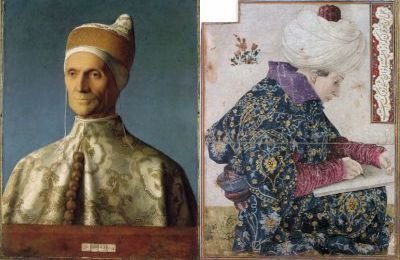Bellini and the East

The Isabella Stewart Gardner Museum exhibition Gentile Bellini and the East, previously seen in Boston, USA, has arrived at the National Gallery, London, and has been renamed Bellini and the East, presumably to rake in fans of older brother Giovanni, who was one of the great masters of the Renaissance.
Before you get carried away by the hype being showered on Gentile to promote this exhibition - "perfect" and "exquisite" have been used to describe Gentile's Seated Scribe (1479-80) - view it in conjunction with Giovanni's magnificent portrait of The Doge Leonardo Loredan (c1501), which is one of the finest portraits of all time. Its use of three-quarter face was groundbreaking, and its psychological depth has never been surpassed. Clearly this is a man of power. His arrogant bearing, cold gaze and pursed lips remind me of Shelley's Ozymandius "...whose frown, And wrinkled lip, and sneer of cold command..."
Then look at Gentile's traditional portrait, which is clearly inferior. It tells us nothing of the man. Its florid Eastern ornamentation confuses the image, and there is no emphatic light source, merely bland overall illumination. You might say it isn't a portrait at all, but profiles have been used as rather unsatisfactory portraits for centuries; look at the heads on coins.
The bowed head, which you might assume is merely a suitable pose for a scribe, is an Islamic tradition. Even portraits of sultans needed to evince humility with a slightly bowed head. Muslims don't just throw wobblers about images of the Prophet; their taboo on idolatry covers portraits and any human form that might be taken as inviting worship. So architecture and intricate patterns are the safest forms of art in Islam. Any artist who creates a David or a Venus risks a beheading.
So, ignore the hype. Gentile never became his brother's equal. He had a pleasant holiday in Constantinople - a city ensnared in an artistic timewarp, due to the idolatry taboo - where he painted some pretty piccies but learned nothing to further his talent, while brother Giovanni stayed in Venice and pushed art into brilliant new realms.
Judge for yourself. Bellini and the East runs from 12 April to 25 June 2006 in the National Gallery's Sunley Room, admission free. While you're there, go worship Giovanni's Doge.




0 Comments:
Post a Comment
<< Home